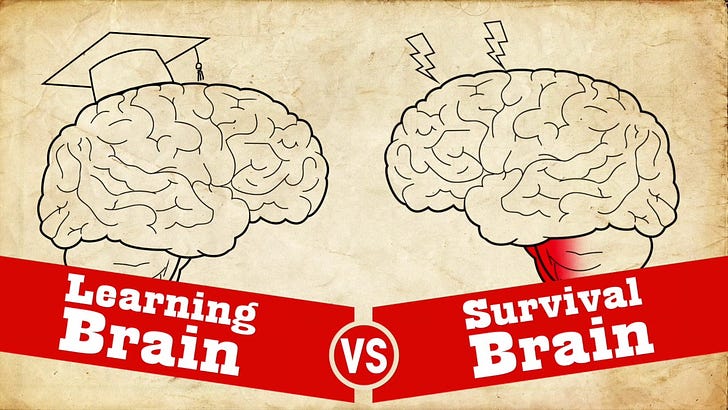Learning Brain vs Survival Brain
Thoughts on Video by Dr. Jacob Ham
Learning vs Survival
In the video, Dr. Ham excellently explains the impact of trauma on learning. While his intended audience is teachers, the points apply to survivors of childhood trauma. The rock illustration provides a clear image of the effort involved to access the learning brain when the survival brain dominates a person’s actions and reactions.
Dr. Ham also stresses that a strong support system is vital to the child’s ability to relax, have fun and learn. Without such a system, a child becomes overwhelmed by the circumstances and cannot see beyond their immediate surroundings. Instead of enjoying life and learning, the traumatized child worries about the next episode of trauma.
As I look back on my childhood, I wonder how I did well in school given the abuse I endured. Where did I get enough emotional support to counter the dominant survival brain? I recall times when I struggled with learning and those were the times when the abuse was the most severe.
During most of my childhood, I loved school. School provided an escape from the trauma. From the first day of kindergarten through most of the third grade, my teachers created the environment that Dr. Ham describes in the video. At the end of third grade, I lost my teacher’s respect when the teacher caught me cheating. (which I did to avoid losing a friend.) I also lost the friend. My support group vanished as did my ability to control my survival brain. I did not regain my love of school until Junior High when I formed friendships and the severity of the abuse decreased.
However, there is an aspect of the battle that Dr. Ham doesn’t address—The role of faith as a support system. I knew Jesus from a very young age, but I did not fully understand God’s unconditional love. I did not understand the idea that Jesus was in my heart, so I sought Him in the external world. When I could not connect with God, my survival brain took over and my performance in school declined. When I connected to God (Jesus) my learning brain seemed stronger and I performed well in school.
As an adult, understanding how the brain functions helps me cope with my emotional response to triggers. I know when brain fog settles in, it’s time to engage in self-care, rather than beat myself up for not being able to think. Dr. Ham states that “survival brain trumps learning brain every time,” but there is a way to alter the automatic response. When my survival brain kicks in, I’ve learned to pause, focus on who I am, rather than what survival brain tells me. God determines who I am, not the world. I also have a support group that prays for me. I realize I don’t have to fight my battle alone, but I have to ask for help. Now, admittedly, in times of intense stress, I do not always remember to use these tools, but when I succeed, learning brain trumps survival brain. The rock (from Dr. Ham’s video) gets pushed to the top of the hill and stays there.
Community, support, faith and accepting that I need help are key components to short circuiting the survival brain response. Science explains how my mind reacts to trauma and triggers. God provides tools to level the playing field. Both are essential to healing from childhood trauma.
Equipped for Recovery Workshop-Interactive recovery workshop
9/10/2022 In-person and virtual!
Learn more about self-care, support systems, boundaries, and taking thoughts captive!
Tickets available now! Click Here to register



